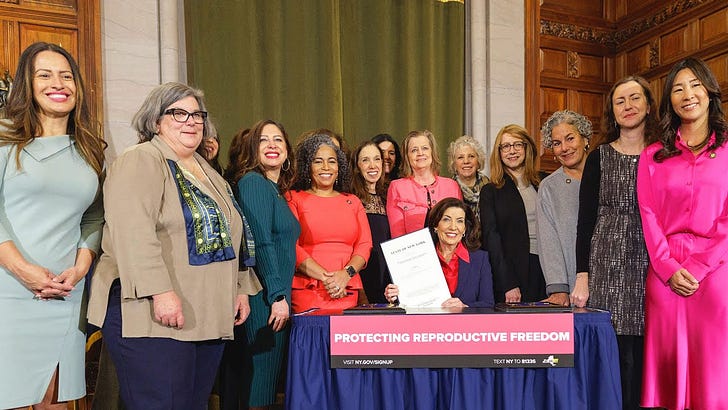Read for a brief overview or click to skip ahead: In Better News, New York’s governor signed a new protection into law that allows providers to keep their names off of prescription labels for abortion medication. In Criminalizing Care & Coercion, a deeper look at Louisiana’s charges against a New York abortion provider and the conservative messaging behind it.
In Better News
I know you already got an email from me today, but I figured you’d want to hear some good news: New York Gov. Kathy Hochul signed a bill that will protect providers who ship abortion medication to anti-choice states.
I flagged this legislation a few weeks ago: The law allows providers to keep their name off of abortion medication prescription labels, shielding them from zealous out-of-state prosecutors.
The signing comes just days after Louisiana indicted a New York doctor who shipped abortion medication to a teen in the state. Dr. Maggie Carpenter, who has also been targeted by Texas Attorney General Ken Paxton, was identified by prosecutors because of her name on the prescription label. “After today, that will no longer happen,” Gov. Hochul said at a press conference.
“Going forward when another doctor prescribes another FDA-approved drug like mifepristone to terminate a pregnancy—they’re simply going to have the name of the health care company on the label, rather than the name of the provider.”
Gov. Hochul also made clear that she would never “under any circumstances” turn Carpenter over to Louisiana. “There's no way in hell,” she said.
In addition to protecting abortion providers from out-of-state prosecutions, the new law will protect doctors from harassment and violence—which has been on the rise since Roe was overturned, and stoked by the Trump administration.
Abortion rights activists are hoping that other pro-choice states will pass similar legislation to protect providers. A few of the folks I spoke to mentioned hopes for California, in particular. (Looking at you, Gov. Newsom!)
Watch Gov. Hochul’s full press conference:
Criminalizing Care & ‘Coercion’
Let’s talk about the Louisiana case for a moment. As you know, the indictment against Dr. Carpenter is the first criminal prosecution of an abortion provider since Roe was overturned. She’s charged with “criminal abortion by means of abortion-inducing drugs,” a felony punishable by up to 15 years in prison.
Louisiana District Attorney Tony Clayton said, “We expect Dr. Carpenter to come to Louisiana and answer to these charges, and if 12 people think she’s innocent then, let it go.” Clayton also likened mailing abortion medication—which has been safely used to end pregnancy for decades—to “shipping fentanyl.”
But it wasn’t just Dr. Carpenter who was charged; the teen patient’s mother was arrested on Friday, with Clayton accusing her of ‘coercing’ her daughter into ending her pregnancy. But as Louisiana reporter Lorena O’Neil points out, the woman hasn’t been charged with coercion.
I can guess why.
Clayton told O’Neil that the teenager’s mother gave her “an ultimatum” to end her pregnancy or move out of the house. If true, it’s clearly a cruel move—but unfortunately not an unusual one. So I find it hard to believe that a jury would send a parent to prison for forcing their pregnant teen out of the house or threatening to do so. (Isn’t that pretty standard for the “family values” crowd?)
But Louisiana Republicans are less worried about making ‘coercion’ charges stick than they are about sending a public message to stave off backlash. Remember: They don’t actually care about coercion, just winning. And back in 2023, anti-abortion activists identified ‘coercion’ as the GOP’s most promising talking point because “no one is openly in favor of coerced abortions.”
That’s why it’s no surprise that anti-abortion lawmakers and activists have been in messaging lockstep since Friday: Louisiana Gov. Jeff Landry said, “This case is about coercion. Plain and simple.” State Attorney General Liz Murrill tweeted, “The allegations in this case have nothing to do with reproductive health care, this is about coercion.” And Katie Daniel, the director of legal affairs at Susan B. Anthony Pro-Life America, said “This case exposes how mail-order abortion drugs are fueling an epidemic of coercion…”
I don’t know how much clearer they can be: Republicans know that Americans are horrified by abortion bans and don’t want to see people charged. So they need to make this case about anything else.
There’s another reason for the ‘coercion’ messaging: Conservatives want this to be a precedent-setting case that goes beyond Louisiana or New York.
As I wrote last week, anti-abortion legal groups and big-money donors have been looking for a criminal case to bring to the Supreme Court; they obviously think this is their winner.
That’s in part because of the opportunity to frame it as ‘coercion,’ and because it involves a teen. (Republicans have spent the better part of two years claiming that teens are in danger of being forced into abortions.)
Before I stop ranting about anti-abortion legal strategy, there’s one more insidious angle that’s worth noting—especially as prosecutors launch more cases like this one: Clayton and Louisiana Republicans claim that the teen patient suffered major complications. Clayton told a religious publication, for example, that she “called 911 and an ambulance rushed her to the hospital and they were able to save her life."
There’s no evidence that the patient’s life was ever in danger, or that she received any medical treatment at all. In fact, it reminds me a lot of what happened when Texas Attorney General Ken Paxton filed a suit against Carpenter. In it, he claimed that a woman who took abortion medication had “serious complications”—but his suit showed nothing of the sort.
The truth is that sometimes women who take abortion medication go to the emergency room because they’re concerned about how much they’re bleeding. But going to the ER and being treated in the ER are very different things; and studies show that the vast majority of abortion pill patients who go to the ER leave without being treated.
Still, anti-abortion activists point to the ER visits themselves as proof that the medication is dangerous, or exaggerate the visits to make it appear as if patients faced severe complications.
I’ll have more on this case in tomorrow’s report, but in the meantime, consider supporting Dr. Carpenter by donating to her organization, the Abortion Coalition for Telemedicine, here.
As New York Sen. Michelle Hinchey said this week, “This doctor and many others are stepping up, and so it is our responsibility to step up for her…”








Worth it for the photo of Hochul's press conference alone: Women! Making decisions about their reproductive health! In public! (instead of a room full of men presuming to make decisions for all of us).
Proud to be a native new yorker today and every day. even if I have to live in idaho and watch this dumpsterfire of a state criminalize women for their mere existence.